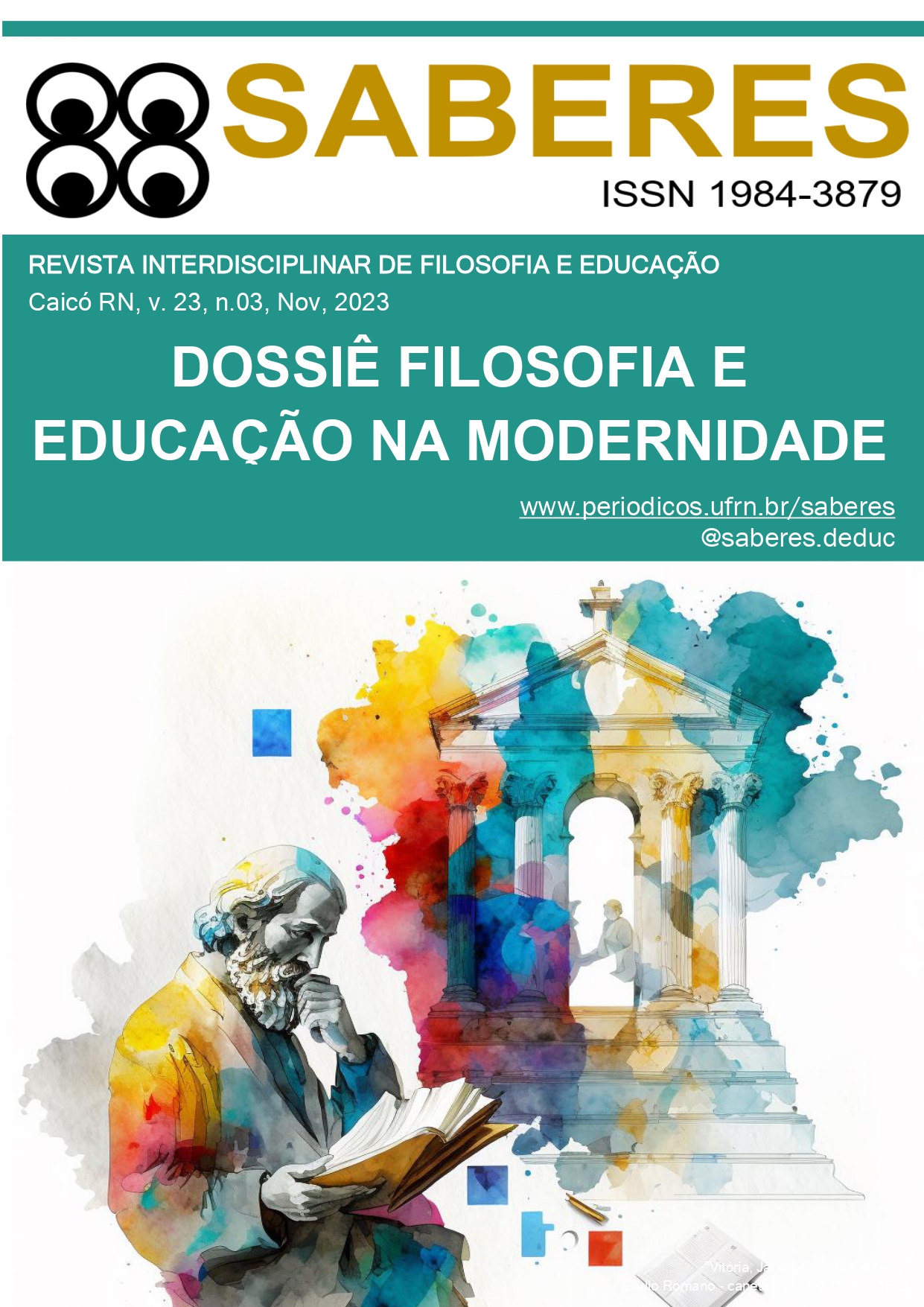Challenges and needs of an ecosophy in the school territory
DOI:
https://doi.org/10.21680/1984-3879.2023v23n3ID33379Keywords:
ecology; ecosophy; environment; society; thought.Abstract
Through Félix Guattari's work "The three ecologies", this article aims to present the author's ecological conceptions and reflect on some challenges faced by the school. Guattari addresses ecosophy, which encompasses environmental, mental (subjectivity) and social ecologies, seeking to promote a transformation in the way we relate to the territory, subjectivity and the world. With the accelerated techno-scientific advance, humanity is facing an unprecedented ecological crisis, and the school cannot stay away from this reality. It is essential to problematize school spaces, rethink an education based on memorization to the detriment of an excess of information, and value idleness and the production of subjectivity. The challenges described here permeate the school environment, its specific practices and the need for a new approach to the production of subjectivity, directing us to the ecological demands of the 21st century. The school must be a space for transformation and awareness, capable of promoting the construction of a more balanced world and aware of its interactions with the environment.
Downloads
References
CATUNDA, Marta Bastos; FORTUNATO, Ivan. As três ecologias da sala de aula. Horizontes, v. 28, n.1, p.55-63, jan./jun. 2010. Disponível em: https://lyceumonline.usf.edu.br/webp/portalUSF/itatiba/mestrado/educacao/uploadAddress/As%20tr%C3%AAs%20ecologias%20da%20sala%20de%20aula%5B16708%5D.pdf. Acesso em 14 de maio de 2023.
DELEUZE, Gilles; GUATTARI, Félix. Mil Platôs, Vol. 1. 2 ed. Tradução de Ana Lúcia de Oliveira, Aurélio Guerra Neto e Celia Pinto Costa. São Paulo: Editora 34, 2011.
___. O que é filosofia? 3 ed. Tradução de Bento Prado Jr. e Alberto Alonso Muñoz. São Paulo: Editora 34, 2010.
FERREIRA, Aurélio Buarque de Holanda. Mini Aurélio: o dicionário da língua portuguesa. 8 ed. Curitiba: Positivo, 2010.
FREIRE, Paulo. Pedagogia da autonomia: saberes necessários à prática educativa. 74 ed. Rio de Janeiro: Paz e Terra, 2022.
GUATTARI, Félix. As três ecologias. 21 ed. Tradução Maria Cristina F. Bittencourt. Campinas: Papirus, 2012.
___. Caosmose: um novo paradigma estético. 1 ed. Tradução de Ana Lúcia Oliveira e Lúcia Cláudia Leão. São Paulo: Editora 34, 1992.
HARARI. Yuval Noah Harari. 21 lições para o século 21. Tradução Paulo Geiger. São Paulo: Companhia das letras, 2018.
HOOKS, Bell. Ensinando pensamento Crítico: sabedoria prática. Tradução Bhuvi Libanio. São Paulo, Elefante, 2020.
ILLICH, Ivan. Sociedade sem escolas. 7.ed. Tradução de Lúcia Mathilde Endlich Orth. Petrópolis: Vozes, 1985.
LIPMAN, Matthew. O pensar na educação. Tradução de Ann Mary F.P. Petrópolis: Vozes, 1995.
MASI, Domenico de. O futuro do trabalho: fadiga e ócio na sociedade pós-industrial. Tradução Yadyr A. Figueiredo. Rio de Janeiro: José Olimpio, 2001.
___. O trabalho no século XXI: fadiga, ócio e criatividade na sociedade pós-industrial. Tradução Aline Leal. 1. ed. Rio de Janeiro: Sextante, 2022.
SERRES, Michel. O terceiro instruído. Tradução de Serafim Ferreira. Lisboa: Instituto Piaget, 1993.
Downloads
Published
How to Cite
Issue
Section
License
Copyright (c) 2023 Knowledge: Interdisciplinary Journal of Philosophy and Education

This work is licensed under a Creative Commons Attribution-NonCommercial-ShareAlike 4.0 International License.
Este obra está licenciado com uma Licença Creative Commons Atribuição 4.0 Internacional.
Autores que publicam nesta revista concordam com os seguintes termos:
a. Autores mantém os direitos autorais e concedem à revista o direito de primeira publicação, com o trabalho simultaneamente licenciado sob a Licença Creative Commons Attribution 4.0 que permite o compartilhamento do trabalho com reconhecimento da autoria e publicação inicial nesta revista.
b. Autores têm autorização para assumir contratos adicionais separadamente, para distribuição não-exclusiva da versão do trabalho publicada nesta revista (ex.: publicar em repositório institucional ou como capítulo de livro), com reconhecimento de autoria e publicação inicial nesta revista.
c. Autores têm permissão para publicar e distribuir seu trabalho online (ex.: em repositórios institucionais ou na sua página pessoal) após a publicação inicial nesta revista, já que isso pode gerar alterações produtivas, bem como aumentar o impacto e a citação do trabalho publicado (Veja O Efeito do Acesso Livre).
Foram feitos todos os esforços para identificar e creditar os detentores de direitos sobre as imagens publicadas. Se tem direitos sobre alguma destas imagens e não foi corretamente identificado, por favor, entre em contato com a revista Saberes e publicaremos a correção num dos próximos números.


 English
English Español (España)
Español (España) Português (Brasil)
Português (Brasil)



